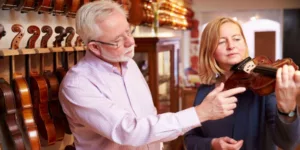Do you think you’ve missed the boat on music just because you didn’t learn how to play at a very young age? Then you’d be wrong. Luckily it’s one of the rare instances when being wrong is actually preferred. Contrary to popular belief, there’s no age cap to learning how to play an instrument. Whether it’s the piano, guitar, violin, or tuba, people of all ages can pick up an instrument and learn to play it well. All it takes is determination, patience, and practice!
You wouldn’t be the only one to think that learning an instrument is for those in grade school. Popular psychologist and Oprah’s best friend, Malcolm Gladwell is partly responsible for this idea. In his 2008 book, Outliers, Gladwell defined his principle for greatness. In order to be talented at any skill, like playing music, you need to devote 10,000 hours towards it. On its own, this number can pose a challenging goal, but 10,000 hours once you’re in your 30s, 40s, or 50s(with a full-time job and family) can be downright intimidating. Starting when you’re young, on the other hand, makes reaching this goal a lot easier.
Thankfully, there’s been some dissention in the ranks of psychologists, and some experts have started to question Gladwell’s principle. It’s not so much the exact number of hours that you can devote to your practice but the quality of time spent with your instrument. Deliberate practice that evolves as your skills improve is the key to unlocking any instrument. Frans Johansson, author of The Click moment, suggests there may even be more factors that can affect your success of learning a new skill, but scientists are still determining what those may be.
In terms of learning an instrument, part of your success lies in your commitment. You have to want to learn in order to meet your goals, so picking an instrument you find fun and interesting will definitely help your case. Having a trained professional show you the optimal way to practice is another way to guarantee your success. You can try a music lesson in Toronto, in New York, or any other city that has a reputable music store to see if a particular instructor’s method complements your learning style. Don’t be afraid of being picky; your music lessons should inspire you. Finding a music teacher that can share their tricks and techniques in engaging ways can help you find the motivation to practice.
Once you carve out a time in your busy schedule, you’ll find that there’s no truth in the adage that old dogs can’t learn new tricks. If you believe in yourself and team up with an instructor that has confidence in your abilities, then there’s no stopping you at any age. All you need is enthusiasm and patience to find time for your practice, and you’ll be able to learn the piano, guitar, or any other instrument you put your mind to.








